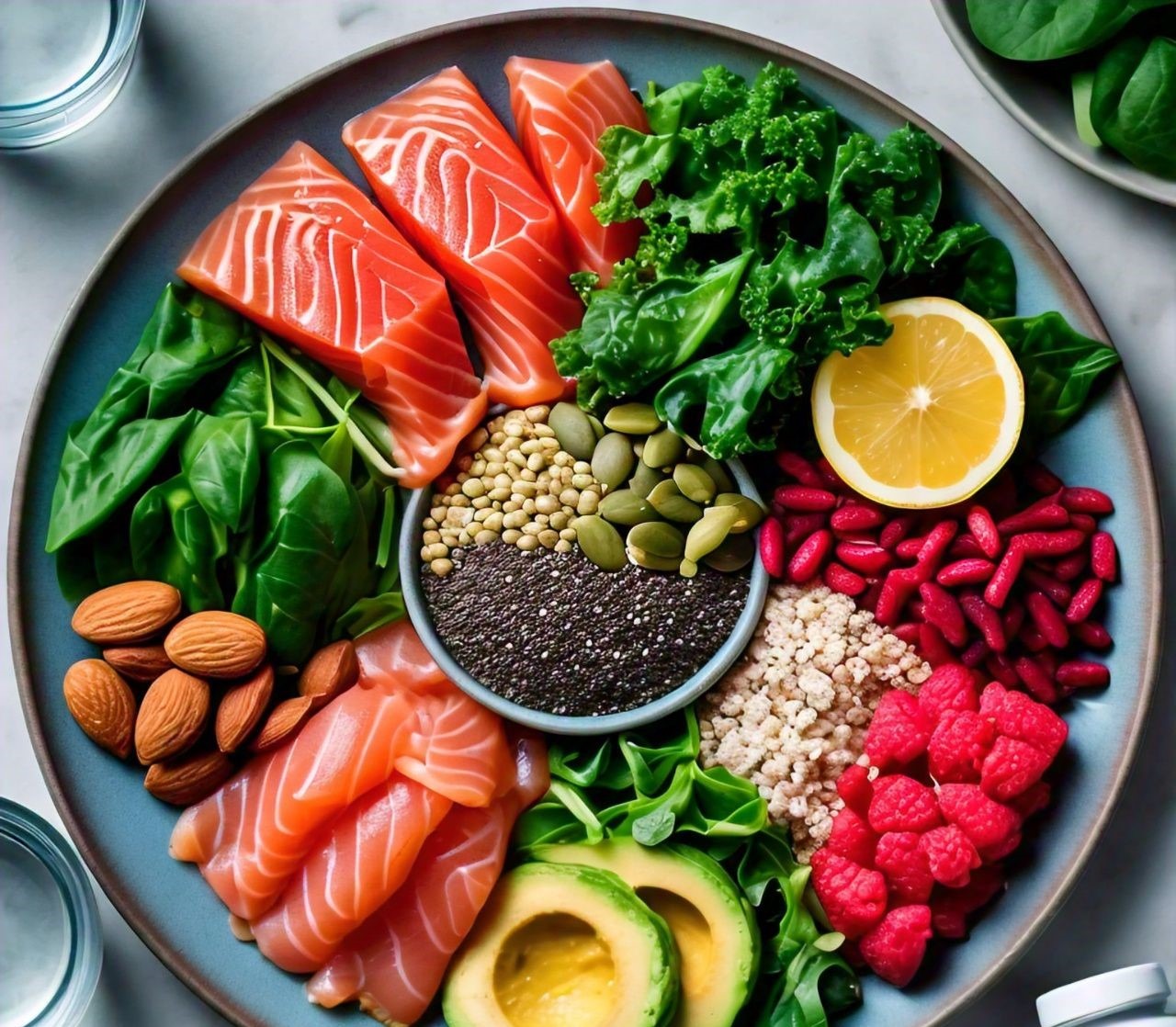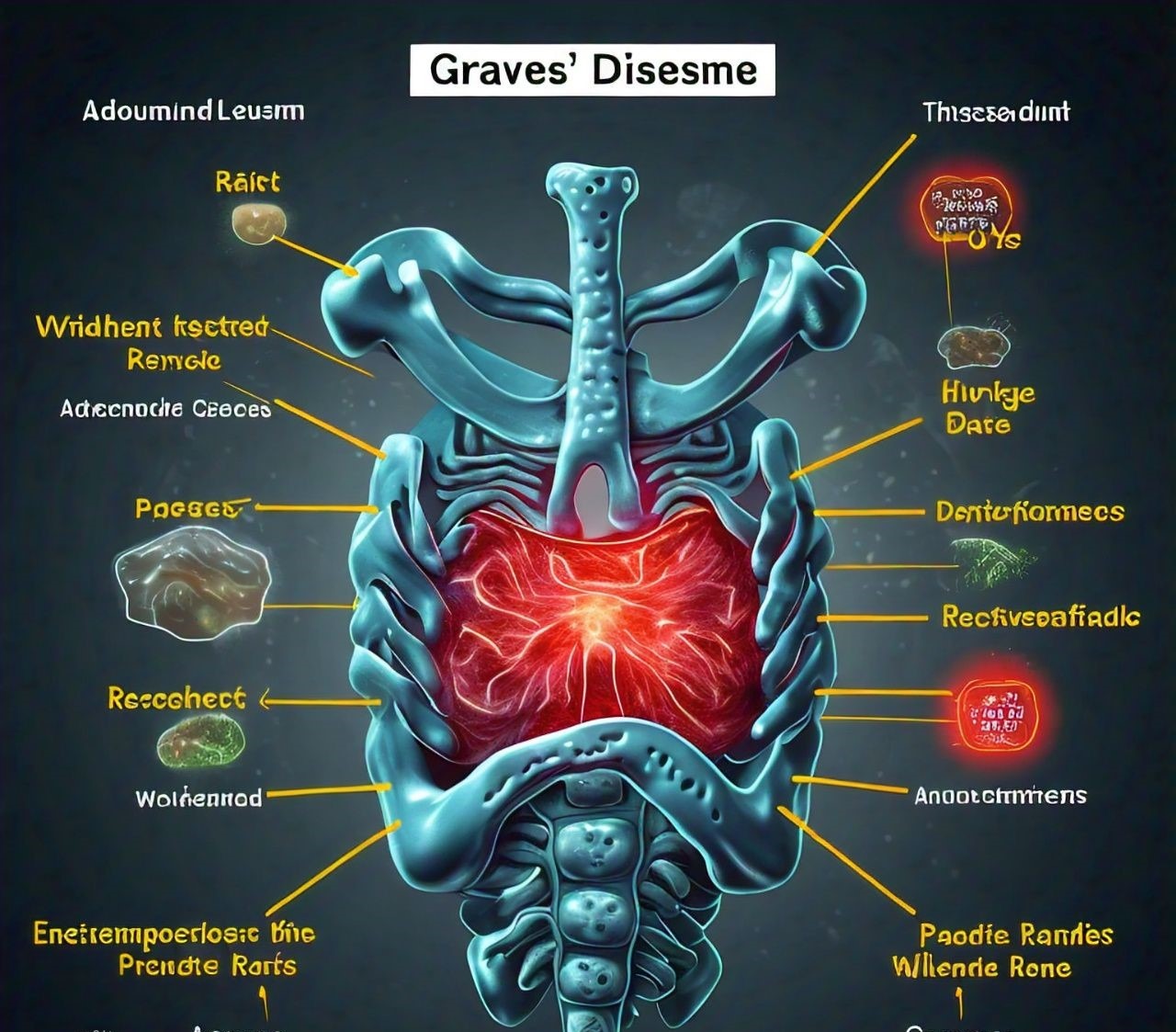Introduction
Graves’ Disease is an autoimmune disorder that affects the thyroid, leading to an overproduction of thyroid hormones (hyperthyroidism). This hormonal imbalance can cause a range of symptoms that impact metabolism, heart rate, and overall well-being. While medical treatments are essential, diet also plays a key role in managing Graves’ Disease symptoms and promoting better health. In this comprehensive guide, we’ll explore how diet affects Graves’ Disease and the specific foods you should eat or avoid to manage the condition effectively.
What Is Graves’ Disease?
Understanding Graves’ Disease
Graves’ Disease is the most common cause of hyperthyroidism, a condition where the thyroid gland produces excessive thyroid hormones. These hormones regulate your body’s metabolic rate, affecting everything from energy levels to heart function. People with Graves’ Disease often experience symptoms like unexplained weight loss, anxiety, tremors, bulging eyes, and irritability. It’s an autoimmune disorder, meaning the body’s immune system mistakenly attacks the thyroid gland, leading to its overactivity.
According to the American Thyroid Association, Graves’ Disease affects about 1 in 200 people in the United States, with women being more likely to develop it than men. While the exact cause is unknown, it is believed to be a combination of genetic and environmental factors, including stress, infections, and possibly diet.
Causes of Graves’ Disease
Graves’ Disease can develop due to a mix of factors:
- Genetics: Family history plays a significant role in autoimmune disorders, including Graves’ Disease.
- Autoimmune dysfunction: The immune system attacks the thyroid, mistaking it for a foreign invader.
- Environmental triggers: Stress, infections, and certain lifestyle choices may trigger or worsen the condition.
The Role of Diet in Managing Graves’ Disease
How Diet Affects Graves’ Disease Symptoms
While there is no specific “Graves’ Disease diet,” what you eat can have a profound effect on how well you manage the condition. Diet impacts your thyroid function, immune system, and overall health. Since Graves’ Disease is linked to inflammation and autoimmune dysfunction, a diet that reduces inflammation can help control symptoms.
Important dietary considerations for people with Graves’ Disease include:
- Balancing iodine levels: The thyroid relies on iodine to produce hormones, but too much or too little can exacerbate the condition.
- Anti-inflammatory foods: These help reduce autoimmune flare-ups.
- Nutrient-dense foods: Focus on nutrients that support thyroid health, like selenium and zinc.
According to a 2018 study published in the Journal of Thyroid Research, dietary interventions in thyroid disorders can help reduce the need for aggressive medical treatments and improve quality of life for patients.
Can Diet Help Manage Graves’ Disease Naturally?
While diet alone cannot cure Graves’ Disease, it can complement medical treatments. A balanced, nutrient-dense diet can help mitigate symptoms, support thyroid function, and strengthen the immune system. For example, anti-inflammatory foods may reduce flare-ups, while lean proteins and healthy fats can help counteract the weight loss associated with hyperthyroidism.
Best Foods to Eat with Graves’ Disease
Nutrient-Rich Foods for Graves’ Disease
Eating a variety of nutrient-dense foods can support thyroid health and help manage Graves’ Disease symptoms. Here are some essential nutrients and the foods rich in them:
Selenium-Rich Foods
Selenium plays a crucial role in thyroid hormone metabolism and reduces inflammation in the thyroid. Studies have shown that people with Graves’ Disease often have lower selenium levels.
Foods high in selenium include:
- Brazil nuts (1–2 per day can meet your daily selenium needs).
- Sunflower seeds.
- Fish like tuna and sardines.
A study published in The Lancet suggested that supplementation with selenium can help restore normal thyroid function in some people with autoimmune thyroid disorders.
Iodine in the Diet
Iodine is vital for thyroid hormone production, but excessive intake can worsen Graves’ Disease by overstimulating the thyroid. It’s important to consume iodine in moderation.
Sources of iodine include:
- Seaweed (kelp).
- Dairy products.
- Eggs.
Anti-Inflammatory Foods
Because inflammation plays a key role in autoimmune conditions, incorporating anti-inflammatory foods can help manage Graves’ Disease.
Examples of anti-inflammatory foods:
- Leafy greens (spinach, kale).
- Berries (blueberries, strawberries).
- Fatty fish (salmon, mackerel).
- Turmeric (contains curcumin, which reduces inflammation).
Protein and Graves’ Disease
Protein is important for maintaining muscle mass, especially since Graves’ Disease can lead to unintended weight loss. Eating lean proteins can help replenish lost muscle.
Good sources of lean protein:
- Chicken and turkey breast.
- Tofu and tempeh.
- Legumes and lentils.
Healthy Fats for Thyroid Support
Healthy fats, particularly omega-3 fatty acids, can help reduce inflammation and support overall thyroid health.
Best sources of healthy fats:
- Salmon and other fatty fish.
- Flaxseeds and chia seeds.
- Walnuts.
Fiber for Digestive Health
Graves’ Disease can sometimes lead to digestive issues, making it important to consume sufficient fiber.
Fiber-rich foods:
- Whole grains like oats, quinoa, and brown rice.
- Fruits such as apples, pears, and berries.
- Vegetables like carrots, broccoli, and leafy greens.
Foods to Avoid with Graves’ Disease
What Foods Worsen Graves’ Disease Symptoms?
Certain foods can aggravate Graves’ Disease symptoms or interfere with thyroid function. Knowing what to avoid can help reduce the likelihood of flare-ups.
Processed Foods and Sugars
Processed foods are often high in unhealthy fats, sugar, and salt, which can increase inflammation and stress the immune system.
Foods to avoid:
- Packaged snacks and fast foods.
- Sugary beverages (soda, energy drinks).
- Refined grains (white bread, pastries).
Caffeine and Stimulants
Caffeine can worsen anxiety, heart palpitations, and restlessness, all of which are common symptoms of Graves’ Disease. Limiting or avoiding caffeine is recommended.
Caffeine sources to limit:
- Coffee.
- Tea (black and green).
- Energy drinks.
Gluten and Autoimmune Reactions
Some studies suggest a link between gluten and autoimmune disorders like Graves’ Disease. Gluten can trigger inflammation in some individuals.
Gluten-containing foods:
- Wheat, barley, and rye.
- Processed foods with hidden gluten.
Soy and Thyroid Function
Soy products can interfere with the body’s ability to absorb thyroid hormones. While moderate consumption may be fine, it’s best to limit intake.
Soy products to watch:
- Tofu.
- Soy milk.
- Edamame.
Foods High in Iodine – Caution with Excess
While iodine is necessary for thyroid hormone production, too much iodine can lead to an overactive thyroid, worsening Graves’ Disease symptoms. Foods like kelp, seaweed, and iodized salt should be consumed with caution.
Vitamins and Supplements for Graves’ Disease
Are Supplements Necessary for Graves’ Disease?
In some cases, vitamins and supplements can help manage Graves’ Disease symptoms, but they should be taken under the guidance of a healthcare provider. Here are some key supplements to consider:
Vitamin D for Autoimmune Support
Many people with autoimmune disorders, including Graves’ Disease, have low levels of vitamin D. Supplementing with vitamin D can support the immune system.
Sources:
- Fortified foods (milk, cereals).
- Fatty fish (salmon, mackerel).
- Vitamin D supplements.
Magnesium for Relaxation and Muscle Health
Magnesium helps manage muscle cramps, anxiety, and insomnia—common issues for people with Graves’ Disease.
Sources:
- Almonds.
- Spinach.
- Magnesium supplements.
B Vitamins for Energy and Nervous System Health
B vitamins are crucial for maintaining energy levels and nervous system health, which are often affected by hyperthyroidism.
Sources:
- Leafy greens.
- Whole grains.
- B-complex supplements.
Lifestyle Tips to Complement Dietary Changes
The Importance of Managing Stress
Stress can trigger or worsen Graves’ Disease. Managing stress through diet, mindful eating, and relaxation techniques can be beneficial.
Stress-reducing practices:
- Meditation and deep breathing exercises.
- Yoga or tai chi.
- Journaling or spending time in nature.
Sleep and Graves’ Disease Management
Getting enough quality sleep is essential for managing autoimmune conditions. A balanced diet that avoids stimulants and large meals late in the day can promote better sleep.
Hydration and Graves’ Disease
Staying hydrated helps regulate metabolism and supports overall health. Drink plenty of water and avoid sugary or caffeinated drinks that can dehydrate you.
Conclusion
Diet is a powerful tool in managing Graves’ Disease alongside medical treatment. By focusing on nutrient-dense, anti-inflammatory foods and avoiding triggers like excess iodine, caffeine, and processed foods, you can reduce symptoms and improve your quality of life. Always remember to work with a healthcare provider when making dietary changes, especially for a condition like Graves’ Disease, where balancing thyroid function is key.
For more information on fitness and health, check out these resources:
Explore more articles on our site:
- How to Increase Running Stamina for Beginners at Home
- What Happens if You Don’t Get Enough Sleep Consistently: Effects and Solutions
- The Ultimate Guide to Healthy Living in 2024
- The Future of Artificial Intelligence: What to Expect
- Unlocking the Potential of Chat GPT Software: Revolutionizing AI Conversations
- Best Sleeping Position for Peripheral Artery Disease [New 2024]
- How to Increase Running Stamina for Beginners at Home
- 5 New Inner Thigh Exercises for Men and Women




